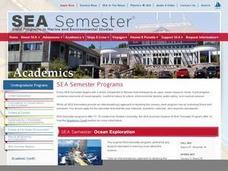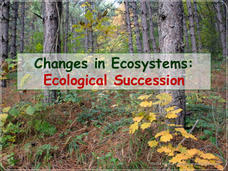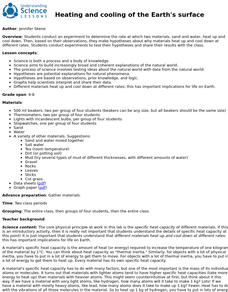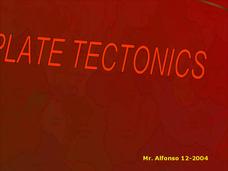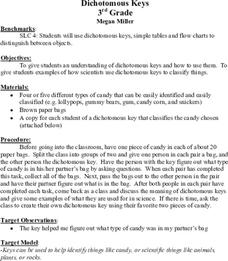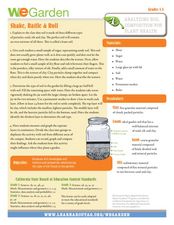Curated OER
Sampling the Ocean Floor
Students sample goodies from an unseen ocean floor and try to accurately describe their composition. This simulation helps students explain the limitations of sampling and the problem of obtaining representative samples of sea floor...
Discovery Education
Sonar & Echolocation
A well-designed, comprehensive, and attractive slide show supports direct instruction on how sonar and echolocation work. Contained within the slides are links to interactive websites and instructions for using apps on a mobile device to...
Curated OER
Plants and Ecosystems
The relationships within and between ecosystems can be explored. after examining an area for living and non-living things young scholars complete the same examination in the forest ecosystem. Students identify abiotic and biotic elements...
Biology Junction
Changes in Ecosystems: Ecological Succession
Can an area with no soil turn into a forest? Scholars learn about the process of ecological succession using an interesting presentation. It covers both primary and secondary succession in the building of new ecosystems.
ARKive
Biodiversity and Evolution
Why is diversity in biology so important for an ecosystem? Explore biodiversity, evolution, and natural selection with a presentation for your biology class. It features clear information, activities for further understanding, and...
University of California
Heating and Cooling of the Earth's Surface
Scholars collect data from heating sand and water before forming testable hypotheses about why sand heats up faster. Afterward, they develop and run experiments to test their hypotheses.
Curated OER
Stream Scanners
Students investigate quality of water in a stream, lake, or pond by examining chemical, physical, and biological characteristics.
It's About Time
Mass Extinction and Fossil Records
The focus of a fossil-based lesson uses graphs and charts that allow young paleontologists to make inferences about events of mass extinction. They must apply their previous knowledge about fossil records in this final lesson of the...
Biology Class
Plate Tectonics
A great reference to include in the classroom and on your class website, the presentation covers the following topics: Alfred Wegener's theory of continental drift, Pangea, layers of the earth and their properties, convection, plate...
Chicago Botanic Garden
Climate and Forest Ecosystem Services
Forests, through sequestration, capture excess carbon dioxide in our atmosphere and store it, aiding in climate change. The third installment in a four-part series on how climate impacts forests explores carbon sequestration. Classes...
Curated OER
Plate Tectonic - Volcanoes Pre Lab
Second graders draw and compare parts of volcano. They investigate parts of a volcano and distinguish between magma and lava.
Curated OER
Plate Tectonic - Volcanoes
Students examine how all mountains are not volcanoes by dramatizing how volcanoes erupt.
Curated OER
Plate Tectonic - Volcanoes Post Lab
First graders draw an erupting volcano. They learn the components of an erupting volcano.
Curated OER
Exploring Hawaii's Beaches
Fourth graders search the shore and find objects on the beaches of Hawaii. In this exploring Hawaii's beaches lesson, 4th graders play "I Spy" with objected collected at the beach. Students compare biotic and abiotic materials and...
Curated OER
Activity #4 Ground Water Model In a Jar
Students devlop a model, which they illustrate a water table and allow for the discussion of common terms and illustrate what those terms mean. They comprehend that a flow rates, removal of contaminants, and the amount of water stored...
Curated OER
Dichotomous Keys
Third graders practice using dichotomous keys. They discover why scientists use them and why it is important to classify animals. They use candy to practice classifying objects and move on to classifying animals.
Curated OER
Avalanche!
Students develop a better understanding of avalanches as a natural hazard. In this investigative activity students design and conduct avalanche experiments.
Curated OER
Guess What?! (a lesson about atoms)
Learners investigate atoms as particles that make up all matter. They examine the mass of matter.
Curated OER
Guess What?!
Students explore how scientists work. In this scientific method lesson, students use their senses to identify objects they cannot see. Students are asked to think like scientists and make observations, comparisons, and interferences, as...
Curated OER
Sustainable Southern Belize: Coral Health Lesson Plan
Fifth graders investigate coral reefs and the dangers they face by labeling and drawing. In this oceanography lesson, 5th graders view a PowerPoint presentation of photographs of coral reefs in Belize. Students investigate and...
Curated OER
Shake, Rattle & Roll
Students examine soil. In this science lesson, students examine the layers of soil. Students collect soil from various locations and separate the layers. Students record and chart their findings.
Curated OER
Separating Soup Mix
Students use screens of three sizes to separate a mixture of five solid materials. They plan and conduct simple investigations using appropriate tools, measures, and safety rules and record and report observations, explanations, and...
Curated OER
Food For Energy - Four Food Groups
Students consider how food is converted to energy. In this science lesson plan, students explore the importance of eating properly with a balanced diet as they study 4 food groups.
Curated OER
Our Water Resources
Learners build a model aquifer to study groundwater zones and water table formation. Students use the models to measure the movement of polluted groundwater.


